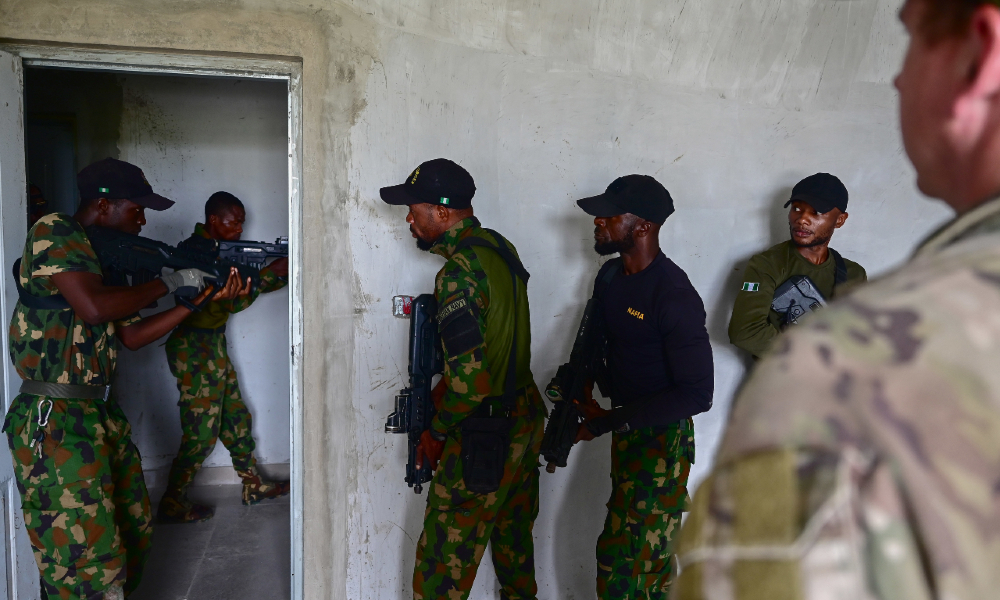Online Incitement, Foreign Terrorist Fighters, and the Dutch Context Investigation
On December 10, 2015, the District Court of The Hague convicted eight men and one woman for a range of terrorist offenses in the biggest terrorism trial the Netherlands has ever seen.
Published by The Lawfare Institute
in Cooperation With

On December 10, 2015, the District Court of The Hague convicted eight men and one woman for a range of terrorist offenses in the biggest terrorism trial the Netherlands has ever seen. This trial was part of a comprehensive criminal investigation known as the Context investigation, which focuses on a Hague-based recruitment network that encouraged young people to travel to Syria “to participate in the armed jihadi struggle.” Another trial, dealing with seven remaining suspects who have all traveled to Syria at some point, is ongoing.
In the 2015 trial, six individuals were convicted for offenses related in large part to their online behavior. Incitement to commit a terrorist crime—in this instance, participation in the armed jihadi struggle in Syria—and dissemination of inciting content are crimes under Dutch law. These crimes raise a fascinating question: where is the line between freedom of expression and criminal incitement?
The Context investigation started in April 2013 after local police received information from various sources—including concerned family members—that young people were being recruited to join the armed struggle in Syria. During the investigation, suspicions arose that an organized group was behind the recruitment. From 2012 until mid-2014, dozens of young people had left for Syria, most of them from the Schilderswijk neighborhood in The Hague, causing parents of Muslim youth to despair at the idea that their child would be next.
To reach these youths, inciting material was published on websites like De Ware Religie (“The True Religion”) as well as related and personal social media accounts. In its verdict, the Court examined various messages, Facebook and Twitter posts, YouTube videos, articles, speeches, images, and other materials, scrutinizing each item to determine whether it could qualify as criminal incitement. (De Ware Religie was hacked in 2014 and is no longer online, but the website’s Facebook page and Twitter account still exist.)
So what is criminal incitement under Dutch criminal law? In a nutshell, the Dutch legal framework of incitement to commit terrorist crimes consists of two elements: (1) the incited crime, which must have been committed with terrorist intent, and (2) the incitement itself. First, taking part in the armed jihadi struggle in Syria, which is what the accused individuals incited others to do, is regarded as a ‘terrorist crime’ pursuant to article 83 of the Dutch Criminal Code (DCC). In the verdict, the Court discussed the developments in Syria; the crimes committed by jihadi armed groups, including the Islamic State (IS) and Jabhat al-Nusra; and the terrorist intent, defined in article 83a DCC, behind those crimes. It also noted that the accused individuals must have been aware of the fact that “[p]articipation in the armed struggle in Syria on the side of these jihadi armed groups always entails the commission of terrorist crimes.” (The Court uses the fact of this awareness later on to convict some of the accused individuals on other charges, including conspiracy to commit murder with terrorist intent.) Second, incitement is punishable pursuant to article 131 DCC. To fall within this provision, a direct connection must exist between the incitement and the crime incited, but the incitement itself can be direct or indirect. Moreover, the act of incitement is complete once it is communicated—whether the incited act is actually committed is irrelevant. Incitement must also be done publicly and, as the Court notes, publicly accessible Internet pages qualify as such while a secret Facebook group does not.
A major point of contention in this case was where the District Court of The Hague should draw the line between innocent (online) behavior and criminal incitement. This touched upon a sensitive issue: many of the accused stated a belief that they were being prosecuted for their interpretation of Islam. The defense argued that the six who were charged with incitement to commit terrorist crimes were being prosecuted not for their acts, but for their ideas. Apparently this struck a chord. The Court prefaced its verdict with remarks emphasizing that this trial did not prosecute the Islam. In paragraph 1.7, it even included a list of acts that are not punishable:
(1) Coming together to study the Qur’an, or gaining a more in-depth knowledge of Islam or certain denominations within the Islam;
(2) Doing Da’wah, which is an invitation to (or preaching of) Islam, whether publicly or privately, online or offline;
(3) Organizing and participating in demonstrations, whether they draw attention to the position of Muslim detainees or protest against the suppression of the Syrian population by Bashar al-Assad;
(4) Collecting money or goods for humanitarian assistance to victims of the violence in Syria;
(5) Protesting against foreign policy of the Western world or the Netherlands;
(6) Campaigning against democracy as a form of government and criticizing the Netherlands in this respect;
(7) Openly sympathizing with the goals and acts of terrorist organizations such as the IS and al-Qaeda.
What, then, is the tipping point? The Netherlands is bound by the European Convention on Human Rights, so whether a communication or document should be considered as inciting under criminal law must be tested against the freedom of expression as protected by the article 10 of the Convention. Any restriction on the freedom of expression must be provided by law (in this case: the Dutch Criminal Code), serve a permissible purpose (in this case: the prevention of crimes), and be necessary in a democratic society (meaning there is a pressing social need and the restriction satisfies the requirement of proportionality, something that demands a case-by-case assessment). Expressions that shock, hurt, or disturb are protected, while those that incite to hatred, violence or discrimination are not.
What it boils down to is how “incitement” is interpreted. The Court summed it up as follows (para. 11.8): “Incitement is not compelling someone to perform an act, but rather provoking the thought of an act, trying to establish the opinion that this is desirable or necessary and to rouse the desire to bring it about.” This means that, for instance, posting a video of James Foley’s decapitation on social media is not criminal incitement in the Netherlands. Neither is posting an image of the seal flag (the black flag designed by al-Qaeda, now used by IS), as The Hague Court of Appeal reiterated recently in a different case (para 10.2.1). Posting such a video or image and adding “let’s go to Syria and kill journalists,” however, is incitement. In making such assessments, the Court looks at a number of factors, such as the context, location, target audience, and meaning of the communication. And the Court’s evaluation of the evidence in this case seems to imply an extra factor, also suggested in Dutch legal scholarship: that there must be a realistic chance that the incited crime will occur. This is reminiscent of the test laid out in Brandenburg v. Ohio, as discussed here (Bobby Chesney), here (Matthew Weybrecht), and here (Peter Margulies). However, such an extra factor is never made explicit in the Dutch Court’s verdict.
Unlike in the UK, glorification of terrorist crimes is not in itself punishable as criminal incitement in the Netherlands, as also emphasized by the Court in this case (para.11.17). However, expressing a “high moral appreciation” of an act could enter the realm of criminal incitement (para. 12.4). Thus, in theory, some variants of glorification could be labeled as high moral appreciation. In this case, however, all expressions of “high moral appreciation for the jihadi struggle” were accompanied by language suggesting that people should also go to Syria and physically take part in that struggle.
Could re-tweeting qualify as showing high moral appreciation? No, it could not. The court acknowledged that a re-tweet is not an endorsement. Simply re-tweeting or sharing inciting content without any extra commentary is still punishable in the Netherlands, though—dissemination of inciting content is a crime under article 132 DCC. One of the accused individuals in this case, Imane B. (note: Dutch courts and media do not publish people’s surnames) was sentenced to seven days in prison for a single re-tweet of a photo posted by her husband with the words “New picture of Dutch fighters in #Syria. From mu-sic to mu-jahid.” While this re-tweet is not enough to qualify as incitement by itself, it was punishable as dissemination of inciting content.
In sum, the Context investigation fits perfectly with an effort high on the agenda of Dutch law and policymakers: to battle the foreign terrorist fighter (FTF) phenomenon—meaning persons who (try to) travel abroad to join a terrorist organization—and to prevent terrorist attacks on Dutch soil or abroad. According to the Dutch National Coordinator for Security and Counterterrorism, as of July 2016, there are an estimated 260 Dutch FTFs, in a country of about 17 million people. This means the scale of the Dutch FTF problem ranks behind countries like Belgium, France, Germany, and the UK. For the Dutch, however—with Paris a mere five-hour drive from The Hague, and Brussels a short two-hour drive away—the threat feels closer than ever before.





